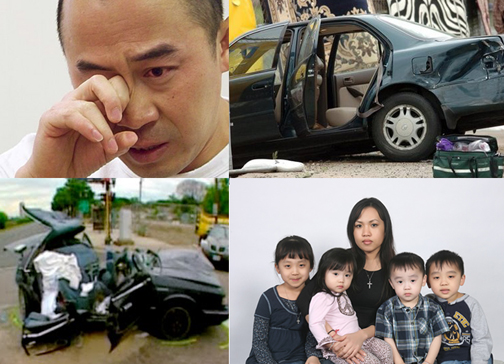Driving home from church with his family in the TOYOTA CAMRY, Koua Fong Lee couldn't stop the 1996 TOYOTA CAMRY from accelerating into another vehicle, killing 2 and a third who later died.
Koua Fong Lee was prosecuted, taken from his young family and sent to prison.....
until others spoke up, got involved and pursued TOYOTA for its defective vehicle.
Ever the Vulture.....TOYOTA can't allow the jury award to stand.....
....TOYOTA is the Cash Cow for many law firms.....
...rather than correcting KNOWN PROBLEMS to save lives.......TOYOTA clogs the courts with appeals....because it's cheaper....
Toyota appeal: Witnesses should not have testified in Koua Fong Lee crash trial
A jury awarded victims of a 2006 crash $10.9 million, but Toyota claims some testimony should have been barred.
A lawyer for the Toyota Corp. asked a three-judge panel of the Eighth Circuit U.S. Court of Appeals in St. Paul on Wednesday to overturn a $10.9 million verdict in a high-speed crash in 2006, saying a judge improperly allowed irrelevant testimony at a trial nearly two years ago.
Robert Brundage, Toyota’s attorney, said that three witnesses who testified that their 1996 Toyota Camrys inexplicably accelerated should not have been permitted to testify because their circumstances were different.
On Feb. 3, 2014, a jury in Minneapolis decided that Toyota must pay $10.9 million in damages for mechanical failures that resulted in a crash at the eastbound Snelling exit of Interstate 94 in St. Paul that cost three people their lives, and sent another man, Koua Fong Lee, the driver of a 1996 Camry, to prison for 2½ years.
Lee’s attorneys had argued that Lee applied the brakes, but his Camry accelerated, plowing into a 1995 Oldsmobile Ciera at the end of the Snelling Avenue ramp, killing two people in the Ciera and leading to the death of a third person.
Lee was prosecuted by the Ramsey County attorney’s office and sent to prison, but was released after his attorneys presented evidence of other incidents of unintended acceleration involving Camrys.
The jury in the 2014 civil trial found that Toyota was 60 percent responsible and Lee was 40 percent responsible for the crash.
Robert Hilliard, the attorney representing Lee, built a case that the pulleys in the throttle that operated the accelerator became bound because the engine overheated, leading the Camry to speed up when Lee was trying to slow it down.
Brundage told the three-court panel that U.S. District Judge Ann Montgomery should not have allowed the testimony of three people who stated that they also experienced unintended acceleration while driving their Camrys. He said the acceleration in those cases was not attributable to overheated pulleys.
“There is just no evidence that those other incidents were caused by the defect here,” Brundage said.
A mini-trial?
Appeals Court Judge James Loken, the presiding judge on the three-member panel, seemed skeptical of Brundage’s arguments, suggesting Brundage was seeking a mini-trial on the three other cases and presenting the same level of evidence as was offered in the 2014 trial.
“That is not workable,” Loken said.
Brundage also contended that the victims’ attorneys failed to produce evidence to back up their claim that the pulleys bonded under intense heat.
“It was all a smoke screen,” he said.
Attorney Eric Magnuson of the Robins, Kaplan Miller and Ciresi law firm and former chief justice of the Minnesota Supreme Court, represented Lee and the other accident victims at the hearing on Wednesday. He defended the verdict, saying Judge Montgomery properly admitted the testimony of the other drivers who experienced unintended acceleration.
He said that John Stilson, an auto and safety consultant who explained in court how the pulleys could stick together and cause the acceleration, was “a highly qualified engineer.”
“It wasn’t a manufacturing defect, it was a design defect,” said Magnuson, caused by overheating a plastic pulley.
Money not paid yet
Toyota had claimed in court documents it had conducted a heat test on the pulleys before the Camry was put on the market, but a month before the trial, disclosed that no such test had ever been conducted, Magnuson said.
The jury had the option of deciding the accident was caused by Lee stepping on the accelerator pedal when he should have applied the brakes, or as an alternative, the pulleys becoming stuck, causing the acceleration. “It clearly decided the throttle was stuck,” said Magnuson.
The $10.9 million awarded the victims has not been paid pending the appeal, and could balloon to about $20 million with interest if Toyota loses, Hilliard, Lee’s attorney, said after Wednesday’s hearing. “I’m optimistic the 8th Circuit will agree with Judge Montgomery and the verdict.”
Toyota said in a statement Wednesday that it sympathized “with everyone affected by this unfortunate accident” in 2006, but did not believe the verdict was supported by the plaintiffs’ evidence.
“In our view, the evidence shows that Mr. Lee’s 1996 Camry was well-designed and was not the cause of this accident,” the statement read. “For those reasons, we continue to move forward with our appeal.”
There is no timetable on when the 8th Circuit panel must rule. Decisions often take months.









